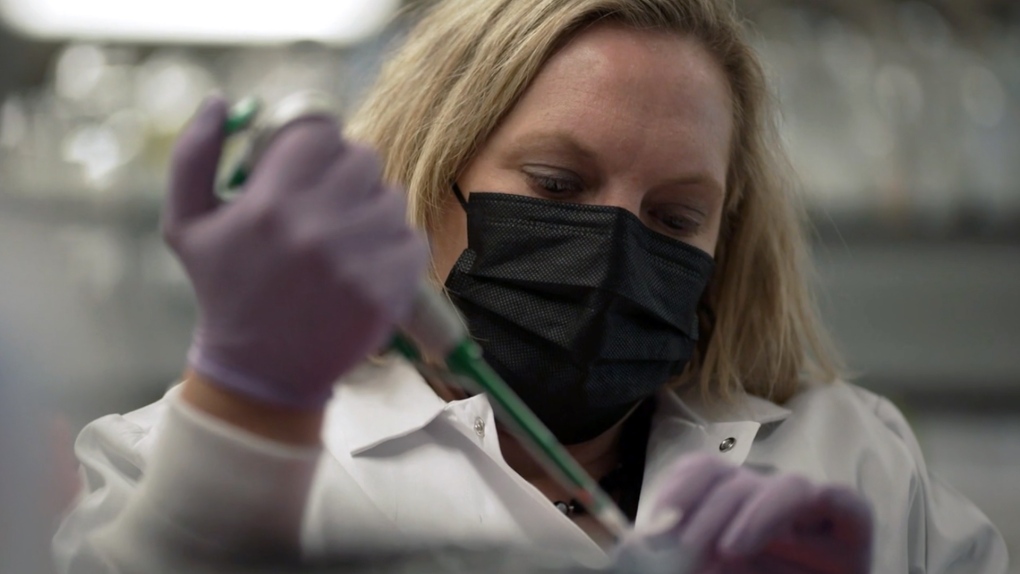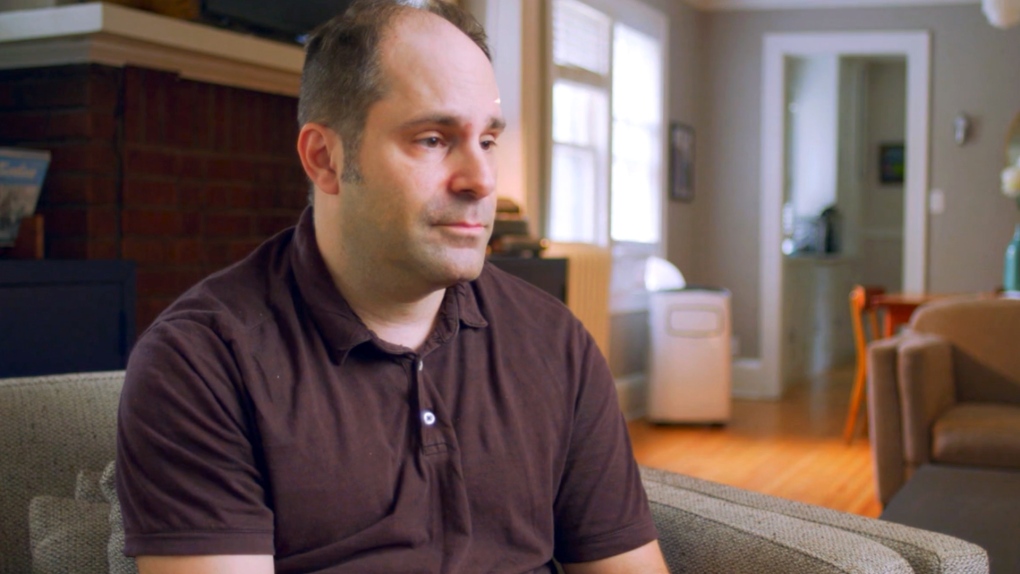Why industrial farm animals could be the source of the next pandemic
Why should you care about stressed farm animals? They could help spark the next pandemic.
Although we’re slowly edging towards the end of the COVID-19 emergency in Canada, virus experts tell us the next pandemic is not a matter of if, but when.
Epidemiologist Rob Wallace believes the way we’re farming meat animals in industrial conditions will not only create more deadly viruses, called pathogens, but that the next one might kill a billion people.
Industrial farmed animals are kept in extremely tight quarters with little or no outdoor access. Those conditions allow any virus to easily jump from one animal to the next. That’s also the reason humans have been told to physically distance during this pandemic. But Wallace says it’s not only the speed at which these deadly viruses can grow.
“You end up selecting for much more dangerous pathogens,” he told W5, adding, “We've seen a documented increase in the number and types of pathogens that are spilling over into human populations, primarily out of industrial raised livestock and poultry.”
About 75 per cent of new infectious diseases are zoonotic, meaning they started in animals. They’re responsible for about one billion illnesses and millions of deaths every year.
The stress that those packed animals in industrial farming are under also plays a huge role. The higher the stress an animal is subjected to, the less they’re able to fight new diseases.
“If animals are commercially farmed a virus can spread through them like wildfire,” virologist Angie Rasmussen told W5. Asked if we’re going to see more viruses spreading from animals to humans in the future, she emphasized one word: “Absolutely.”
 Virologist Angie Rasmussen on W5
Virologist Angie Rasmussen on W5
What can be done to help slow the inevitable? None of the experts we spoke with said the answer would be to stop eating meat. Instead, they underlined that we should be aware of where our meat comes from, since animals raised in less cramped, less stressful conditions and lived mainly outside had less chance of spreading disease.
That’s also what free-range pig farmer Joanna Shepherd believes in. “I grew up on a family farm in the UK ... and we had pigs that were chained by the neck, which is how it was done in the seventies. And I didn't like that,” she told W5. “So I thought there's a better way than doing it like that. So now we have gone completely opposite.”
Her small herd of about 50 pigs live outside, root around and wallow in the mud. She feels it’s a more natural way for them to live until they end up on the dinner plate. “It makes them happy. It makes them taste better, too.”
Farming animals in a more natural environment doesn’t come cheap, though, and Joanna knows she could make more by industrializing. But for her, that’s not an option. “If it saves one pig going through an industrial lifestyle ... I feel better about that,” she said.
It’s not the common corporate way, though. With increased demand for meat, industrial farms are getting bigger and bigger. One pork producer in China has built a multi-story mega farm that looks like an enclosed high rise car park -- with nearly two million pigs coming out of it every year. The massive numbers are also seen in the bottom line, with the company’s profit jumping by more than 1,400 per cent.
“There's a lot of money to be made to keep the system going in this direction,” said Rob Wallace. He adds it’s not only profits that are rising and viruses increasing from massive farms, they’re also breeding for deadlier viruses. “It's not done on purpose. It's just that the economic model under which they organize are directly related toward moving as much protein to the market as fast as possible,” he told W5.
 Epidemiologist Rob Wallace (W5)
Epidemiologist Rob Wallace (W5)
Wallace notes the time to prevent the next pandemic is now. “We are at a historical crossroads,” he said, “because if we don't do anything, then it's very well likely that we'll have multiple outbreaks and pandemics that can do considerable damage, perhaps even more than COVID 19.”
As relieved as we all are to get near the end of COVID-19, Angie Rasmussen cautions we shouldn’t let our guard down, but learn from it to help prevent the next pandemic. If not, she said, “We are at risk of becoming complacent as we've been in the past.”
CTVNews.ca Top Stories

'Cybersecurity incident' shuts down London Drugs stores across Western Canada
All 79 locations of pharmacy and retail chain London Drugs were shut down Sunday after it was the victim of a “cybersecurity incident.”
CDC says it's identified 1st documented cases of HIV transmitted through cosmetic needles
Three women diagnosed with HIV after getting 'vampire facial' procedures at an unlicensed medical spa are believed to be the first documented cases of people contracting the virus through a cosmetic procedure using needles.
Canucks pull off comeback, top Predators 4-3 in OT
Elias Lindholm scored 1:02 into overtime and the Vancouver Canucks came all the way back to beat the Nashville Predators 4-3 in Game 4 of their first-round playoff series on Sunday.
Deadly six-vehicle crash on Highway 400 sparked by road rage incident
One person was killed in a six-vehicle crash on Highway 400 in Innisfil Friday evening.
Aerial photos show wide devastation left by a deadly tornado in China's Guangzhou
Aerial photos posted by Chinese state media on Sunday showed wide devastation in part of the southern city of Guangzhou after a tornado swept through the day before, killing five people, injuring dozens others and damaging more than 140 buildings.
Ontario to ban use of cellphones in school classrooms starting in September
Ontario is introducing a suite of measures that will crack down on cellphone use and vaping in schools.
Australian prime minister describes domestic violence as a 'national crisis' after protests
Australia's Prime Minister Anthony Albanese on Monday described domestic violence as a 'national crisis' after thousands rallied around the country against violence toward women.
Casey DeSmith won’t start Game 4 for the Canucks
Rookie goalie Arturs Silovs will start in net for the Vancouver Canucks when they face the Nashville Predators in Game 4 of their first-round playoff series Sunday.
Putin likely didn't order death of Russian opposition leader Navalny, U.S. official says
U.S. intelligence officials have determined that Russian President Vladimir Putin likely didn't order the death of imprisoned opposition leader Alexei Navalny in February, according to an official familiar with the determination.
Local Spotlight

Haida Elder suing Catholic Church and priest, hopes for 'healing and reconciliation'
The lawyer for a residential school survivor leading a proposed class-action defamation lawsuit against the Catholic Church over residential schools says the court action is a last resort.
Kitchener family says their 10-year-old needs life-saving drug that cost $600,000
Raneem, 10, lives with a neurological condition and liver disease and needs Cholbam, a medication, for a longer and healthier life.
DonAir force takes over at Oilers playoff games
As if a 4-0 Edmonton Oilers lead in Game 1 of their playoff series with the Los Angeles Kings wasn't good enough, what was announced at Rogers Place during the next TV timeout nearly blew the roof off the downtown arena.
'It was instant karma': Viral video captures failed theft attempt in Nanaimo, B.C.
Mounties in Nanaimo, B.C., say two late-night revellers are lucky their allegedly drunken antics weren't reported to police after security cameras captured the men trying to steal a heavy sign from a downtown business.
Fergus, Ont. man feels nickel-and-dimed for $0.05 property tax bill
A property tax bill is perplexing a small townhouse community in Fergus, Ont.
Twins from Toronto were Canada's top two female finishers at this year's Boston Marathon
When identical twin sisters Kim and Michelle Krezonoski were invited to compete against some of the world’s most elite female runners at last week’s Boston Marathon, they were in disbelief.
Mystery surrounds giant custom Canucks jerseys worn by Lions Gate Bridge statues
The giant stone statues guarding the Lions Gate Bridge have been dressed in custom Vancouver Canucks jerseys as the NHL playoffs get underway.
'I'm committed': Oilers fan skips haircuts for 10 years waiting for Stanley Cup win
A local Oilers fan is hoping to see his team cut through the postseason, so he can cut his hair.
'It's not my father's body!' Wrong man sent home after death on family vacation in Cuba
A family from Laval, Que. is looking for answers... and their father's body. He died on vacation in Cuba and authorities sent someone else's body back to Canada.













































